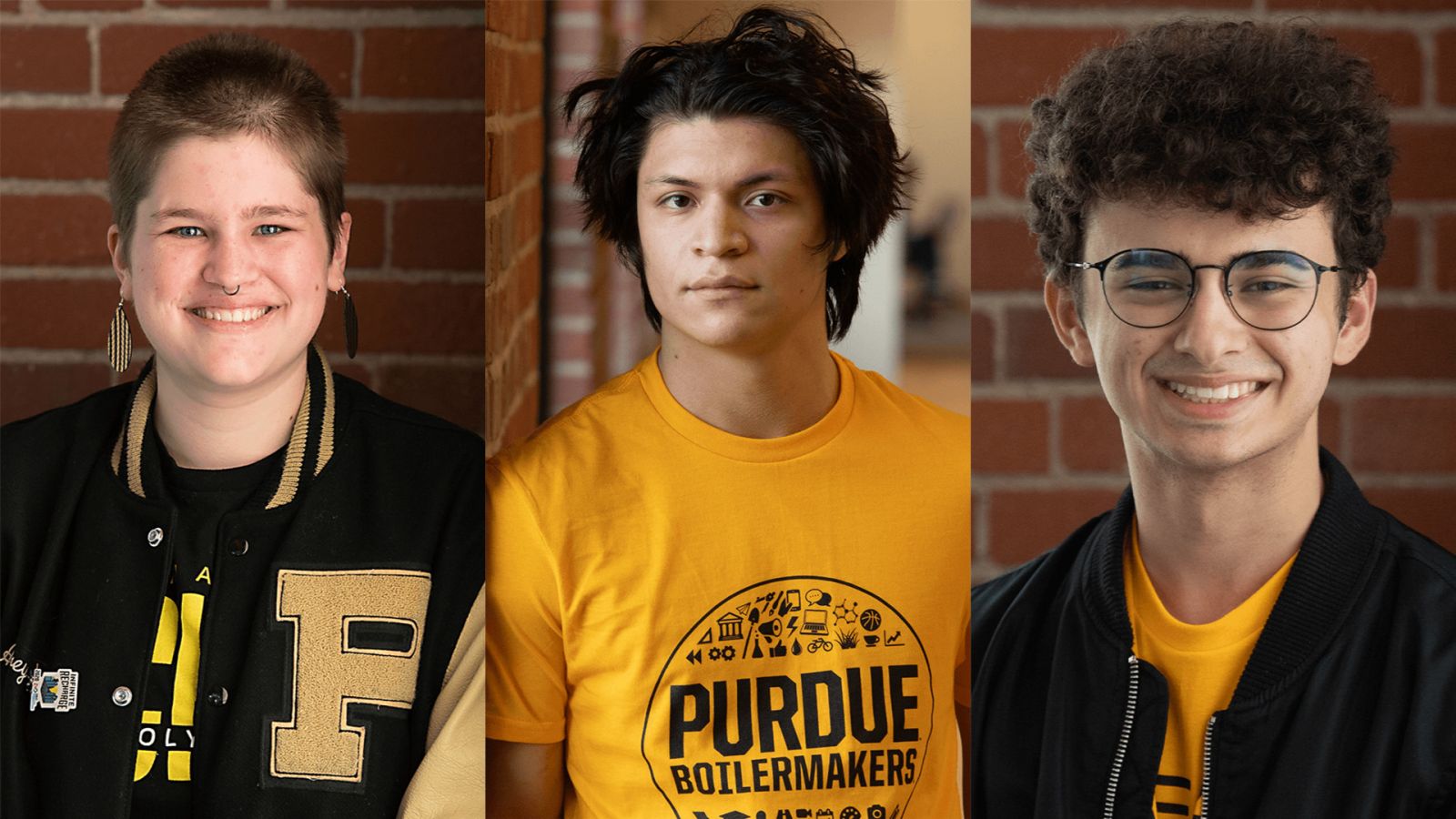
Dow Chemical Company, the nearly 130-year-old multinational producer and Fortune 100 manufacturer, has only been taking interns from Purdue Polytechnic’s student population since fall of 2022. In less than three years, that collaboration has proved to be of tremendous value for both Dow and for Polytechnic students.
For three current Polytechnic students who are also graduates of Purdue Polytechnic High School (PPHS), internships at Dow provided not just opportunities to get further hands-on experience, but to affect lasting improvements in Dow’s processes through their insight.
Audrey Williamson, Keenan McKibben and Eric Martinez, all students at Purdue Polytechnic, took different paths within Dow but shared certain experiences. For each of them, they were able to use their hands-on education experience—which, for them, stretched from the ninth grade all the way to their time as college seniors—to leave their mark on the company in a short time. And in one case, this led directly to a job offer.
Learning from experience
Keenan McKibben, a robotics engineering technology major, reflected on how his time as a member Purdue Polytechnic High School’s inaugural class shaped his approach to problem-solving. “Since we were the first class, we were the guinea pigs,” he said “Every semester, if not every year, we had a new curriculum. This was during the time where even how our work was graded would change. That, along with COVID, made us super adaptable.”
That adaptability proved crucial during his successive internships at Dow, where he was given challenging projects that required both technical and leadership skills. One of his most difficult assignments took place in New Orleans at Dow’s Hahnville location. “I was one of two interns on the entire site. My supervisor came up to me on day one and said, ‘In about a month, the operations leadership team is coming to the plant, and we want to show them how we’ve integrated manual control valve sensors into our digital procedures.’”
McKibben had to integrate third-party sensors into Dow’s internal systems, a task that required navigating cybersecurity protocols, coordinating with numerous experts, and presenting his work to high-ranking executives. “That project was really, really hard,” he admitted. “But I learned so much about project management. It wasn’t just about technical knowledge—it was about taking initiative, finding the right people, and problem-solving on the fly.”
His work ultimately resulted in a system that Dow is continuing to implement. “I got told, ‘When you come back, you’re still going to be the subject matter expert on these sensors.’” He was also able to use his CAD skills to design mounting brackets for the sensors, which Dow is now working to manufacture for wider implementation.
Making an impact
Audrey Williamson, also a robotics engineering technology major, made positive change in no time at all during her internship. Her first project at Dow was streamlining an outdated data intake process. “Everything was still analog,” they said. “I wrote a program to automate it. That was a project which didn’t take me too much time, but it really had this huge impact on the efficiency of that system.”
Williamson’s experience reflects one of Dow’s key goals for its interns. Katelyn DuBois, Dow’s mobility platform lead in their Houston digital operations center, stated that the company seeks out students who are “able to think differently.” “Among our students from the Polytechnic, we get tangible results in the short timeframe of even a single project. They have a level of comfort with technology that we don’t see in most students.”
Eric Martinez, a PPHS graduate who is now a major in mechanical engineering technology, found that Dow placed a reassuring amount of responsibility in the hands of students. “I did a lot of internal research that was designed to help Dow decide whether or not they would go with certain technologies,” Martinez said.
“We knew how important that was, and that it was actually going to go in front of the people who are making those decisions. That was actually really good see, and it did give me this motivation to accomplish more.”
The Purdue Polytechnic value-add
The students credit their PPHS experience for preparing them for success at Dow. McKibben highlighted the school’s emphasis on project-based learning. “We did these project cycles where we’d work with industry partners to solve real problems that they were having,” he said. “Six weeks later, we were pitching our solutions to real companies. That kind of gets you out of your own head and helps you realize that what you’re presenting to these people is genuinely really important.”
Martinez credits his time at PPHS with teaching him “self-sufficiency”: “How you solved a problem was really left up to you or your time, so I think we all learned how to ask for what we need.”
For Dow, they receive students who are already literate in many of these systems and processes that have become industry standards. “Dow seemed to be aware of the fact that what they really want is people who get the technology, and where they can go with it in the future,” Williamson said.
“Every industry needs people who can be effective problem-solvers,” added McKibben. “And I like to think that the cohort I was in showed that we can be exactly that.”
Additional information
